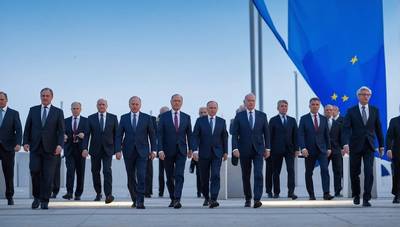EU envoys are expecting to resolve the blockage of new Russia sanctions by this week
Diplomats from the European Union said that they expected to reach an agreement during a summit of the EU this week regarding an 18th package against Russia. Slovakia and Hungary use it as a bargaining tool for concessions about Russian energy. The European Commission proposed the package to encourage Russia to negotiate with Ukraine a ceasefire after EU leaders demanded "massive sanction" in May. The package targets Russia's energy revenue by naming banks and hitting the shadow tanker fleet. Hungary and Slovakia announced on Monday that they would not be supporting the new sanctions unless the proposal to prohibit imports of Russian oil by 2027 was changed.
The ban will be discussed by EU leaders at the European Council in Brussels on Thursday and Friday.
Ignacy Niemczycki is a Polish EU minister. He said: "We're waiting to see the outcome of the summit on Thursday. I think that the conversation will be easier after Thursday."
"We remain optimistic."
Slovak PM Robert Fico, however, reiterated that a vote be postponed until Slovakia's concerns about the energy ban were addressed. He also said he would block sanctions if Slovakia did not address its concerns.
Slovakia claims that shutting down the Russian pipeline will increase prices, particularly in central Europe. Last week, Economy Minister Denisa Sakova stated that the country also wanted a mechanism for capping EU transit fees and guarantees in case there was a shortage of gas.
A diplomat who is familiar with the talks said that Slovakia and Hungary are seeking "different treatment" for countries which have landlocked borders.
One diplomat said: "Hungary's not a problem." If Slovakia lets go, then so will Hungary." SPP, the state-owned Slovak gas importer, said that Gazprom could demand compensation even if SPP declares force majeure if EU imports are banned. SPP's Russian gas contract, which ends in 2034, is valued at approximately 16 billion euros ($18.6billion) at current prices.
The lawyers have warned that it would be difficult to eliminate claims if the Commission went ahead with its plan of using trade measures to ban the product instead of formal sanctions which require unanimous approval.
A spokesperson for the European Commission said, "We've worked very closely with those member states that are most affected by the phase out."
(source: Reuters)




